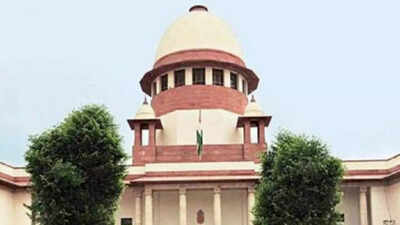Top Searches
- News
- India News
- SC seeks Centre's response on early appointments to CVC
SC seeks Centre's response on early appointments to CVC

NEW DELHI: The Supreme Court on Monday sought the Union government's response in three weeks to a PIL seeking early transparent appointments to Central Vigilance Commission, which is functioning under a single member since June last year in violation of the statute mandating it to be a three-member body comprising a chief vigilance commissioner and two vigilance commissioners.
Appearing for petitioner NGO 'Common Cause', advocate Prashant Bhushan told a bench of Justices Sanjay K Kaul and Abhay S Oka that the mandate of the CVC Act, 2003 has been violated continuously for more than a year as the government displayed a lackadaisical approach towards filling the two vacant posts that of chief vigilance commissioner and a vigilance commissioner.
Bhushan said the government, by a June 24, 2021 notification, had authorised the lone remaining vigilance commissioner Suresh N Patel “to act as the Central Vigilance Commissioner...until the appointment of the Central Vigilance Commissioner.” The bench issued notice to the Union government and posted the matter after three weeks.
After the Vineet Narain judgment in 1998 ordering CVC to be made a statutory "integrity institution", the Vajpayee government had brought in the CVC Act of 2003 making it a multi-member body. In the Centre for PIL case in 2011, the SC had struck down appointment of P J Thomas as CVC and laid down the selection mechanism - all appointments to the CVC were to be made by the President on the recommendation of a committee consisting of the PM, home minister and leader of opposition in Lok Sabha.
The petitioner accused the government of being tight-lipped about the progress in the appointment of CVC and VC even though it had invited applications for the post of VC through a public advertisement on May 4, 2021 and that for CVC on June 7 last year.
However, no appointment has been made till date. In response to queries under RTI Act, the government on September 22, 2021 had refused to share information except parroting that the selection process is underway to appoint CVC and VC, posts are vacant for more than a year, the petitioner said.
"Non-appointment of the commissioners for extended periods of time and thereafter frustration of the citizen's right to information so as to be able to demand accountability from the executive is in violation of rights guaranteed by Articles 14, 19, & 21 of the Constitution of India apart from the scheme and object of the 2003 Act," the NGO said.
Appearing for petitioner NGO 'Common Cause', advocate Prashant Bhushan told a bench of Justices Sanjay K Kaul and Abhay S Oka that the mandate of the CVC Act, 2003 has been violated continuously for more than a year as the government displayed a lackadaisical approach towards filling the two vacant posts that of chief vigilance commissioner and a vigilance commissioner.
Bhushan said the government, by a June 24, 2021 notification, had authorised the lone remaining vigilance commissioner Suresh N Patel “to act as the Central Vigilance Commissioner...until the appointment of the Central Vigilance Commissioner.” The bench issued notice to the Union government and posted the matter after three weeks.
After the Vineet Narain judgment in 1998 ordering CVC to be made a statutory "integrity institution", the Vajpayee government had brought in the CVC Act of 2003 making it a multi-member body. In the Centre for PIL case in 2011, the SC had struck down appointment of P J Thomas as CVC and laid down the selection mechanism - all appointments to the CVC were to be made by the President on the recommendation of a committee consisting of the PM, home minister and leader of opposition in Lok Sabha.
The petitioner accused the government of being tight-lipped about the progress in the appointment of CVC and VC even though it had invited applications for the post of VC through a public advertisement on May 4, 2021 and that for CVC on June 7 last year.
However, no appointment has been made till date. In response to queries under RTI Act, the government on September 22, 2021 had refused to share information except parroting that the selection process is underway to appoint CVC and VC, posts are vacant for more than a year, the petitioner said.
"Non-appointment of the commissioners for extended periods of time and thereafter frustration of the citizen's right to information so as to be able to demand accountability from the executive is in violation of rights guaranteed by Articles 14, 19, & 21 of the Constitution of India apart from the scheme and object of the 2003 Act," the NGO said.
FOLLOW US ON SOCIAL MEDIA
FacebookTwitterInstagramKOO APPYOUTUBE
Start a Conversation
end of article









